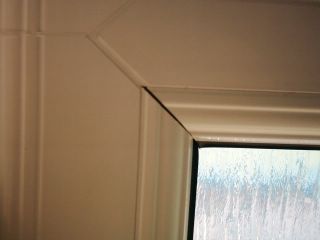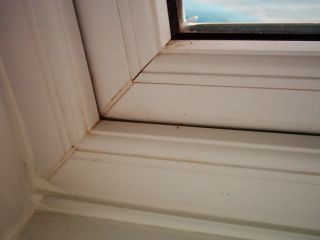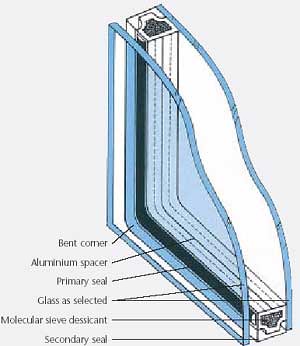All About Windows

"Sit next to a window in a double-glazed home. Notice the absence of draughts and cold spots. See, too, how messy condensation is dramatically reduced."
- http://www.wanz.org.nz/how_dg_works.htm
Sadly I live in a building maintained by my local council. This means that I have to put up with poor quality workmanship and excusses that vurge on being outright lies.
Recently my council chose to replace the windows in the building.
I have to admit that the old windows were very old and not just a little warped. So much so that I had to tape the windows closed with thick masking tape in the winter to keep the heat in.
The masking tape trick worked very well.
However now I have nice warm double galzed windows right?
Wrong! Now I have very cold and drafty double glazed windows.
It is cold and drafty because of condensation. (yes it will be explained).

No more cold spots near windows!
Sitting near a single glazed window in winter can be like being in a refrigerator. That's because cold air enters through normal glass and passes into the room. Warmth is also sucked out through the glass, causing drafts. With Insu-Glas double glazed windows, warm air is circulated back into the room, and cold spots disappear.
- http://www.ziggys.co.nz/doubleglazing.html
My double glazing has large "vent points" that can be opened or closed. In theory closing them removes the draft but of course this simply is not true.
The keyword here is that double glazing gives you insulation - just like putting on an another layer of clothing to keep out the cold.
- http://www.double-glazing-web.co.uk/
Why is this not true?
In part it seems because of the way the new windows were fitted. The cold stone work that was the window ledge on the only windows is still where it was and is simply covered by the nice white placstic of the badly made windows.
No I fear no company taking leagle action as I can proove what I said and will litter this article with photographs to this effect.
Now about that condensation.
It is so bad that these new plastic windows have mold growing on them and need to be cleaned regularly to protect the health of the children.
Naturally I called in the people responsible and complained about the workmanship and the mold.
 His response was to acknowledge the screws sticking out, the ill fitting joints and the damp. His action was to state that the first two were mearly cosmetic and the screws were standard practice. The damp was our fault as we had closed the vents to reduce the draft the wistles through the flat when it is cold.
His response was to acknowledge the screws sticking out, the ill fitting joints and the damp. His action was to state that the first two were mearly cosmetic and the screws were standard practice. The damp was our fault as we had closed the vents to reduce the draft the wistles through the flat when it is cold.
Now if you were to take a trip to http://thanetcouncil.blogspot.com/ you will find (not only a copy of this article) but details of my never ending argument with thanet district council.
I fail to see why fitting windows with screws added on site and at irregular possitions and angles should be considered acceptable.
The seals are crumbling and the joints do not meet very well (if at all).
The chief litigation officer of thanet council wrote to me to say that he was "advised" that "not all windows had screws sticking out from them". Yet this guy who reprisents the people that fitted the windows claimed all windows fitted in these flats and houses had these screws.
Some one somewhere is not telling the truth.
The interior surfaces of energy-efficient windows stay warmer, which means you can maintain a higher level of relative humidity without worrying about condensation on the windows
- http://oee.nrcan.gc.ca/publications/infosource/pub/renovate/windowefficiency/index.cfm?attr=4

Before we continue Relative Humidity (RH) is the measure of saturation of moisture in the air. The warmer the air the more parts per million can be water. When air tempriture decreases suddenly the ammount of water in the air does not change but the point of dew does decrease sot hat at 100% RH we get water droplets forming.
Cold water pipes running through a kitchen that has been in full use for a few hours might drip not because of leaking but because the water is forming on the cold pipes as the local RH crosses the 100% mark.
The same thing happens when you pour a cold drink on a hot day.
When it happens with windows it means that the window is too cold for the RH of the rest of the room.
There are two possible causes too much humidity or too cold a window.
What causes condensation?
The sudden lowering of the temperature of the wall or window surfaces, i.e., the effect of freezing external air on a window when internal temperatures and air moistures and air moisture content remain unchanged.
http://www.double-glazing-replacement-windows.com/condensation.htm
Many questions are asked as to whether increased ventilation would cure condensation, and in most cases this is the most important keyword. In most instances judicious ventilation will help to overcome the problem since it will encourage rapid evaporation of a condensate. However, with increased ventilation may come a tendency for surfaces to become cooled. This is brought about by the air stream passing across the surface of the wall and bringing about the process of cooling by evaporation. The introduction of mechanical ventilation in the form of electric extractor fans can achieve some benefit if they are sited in such a position that humid air will be extracted, but care should be taken to see that it does not extract too much heat from the room, or indeed introduce cold air from outdoors when off.
- http://www.double-glazing-replacement-windows.com/condensation.htm
So yes while some reduction in wetness of windows has been the result of leaving the "vents" open we now have a cold flat where jumpers and gloves are sometimes a good idea if your desk is by the window, even with the heating on.
"condensation forms when moisture-laden air meets a cold enough surface to condense on"
- http://www.thewindowman.co.uk/condensation-why.htm
 The question therefore arrises as to why the new double glazed windows are so cold as to cause perminatnt condenstation with the solution being to expose the room to continouse streams of very cold air that have been shown to cause health problems.
The question therefore arrises as to why the new double glazed windows are so cold as to cause perminatnt condenstation with the solution being to expose the room to continouse streams of very cold air that have been shown to cause health problems.
Double Glazing can greatly reduce condensation.
http://www.thewindowman.co.uk/condensation-cure.htm
But in my case double glazing has increased condensation and reduced heat retention.
Why?
Well an inspection by hand when the room is warm enough and the outside is cold enough shows us an interesting discovery. The windows are coldest near the frames.
The glazing is not a issue but the frames are of such poor quality that they let out more heat than they help to hold in.
Must I pay someone to create an old fasioned "weep-hole" for all the water to run away?
I think the only answer is to humiliate the people involved by pointing out thier lies. This does not supprise me after all the council threatened to evict me and thier builders assulted me for speaking up about the conditions here.
What I want to know is do the windows meet BS EN 1279 for Double Glazed Units? I doubt it very much.
diagram from: http://www.glasstech.co.nz/doubglazp3.html
This writeup is going to be published on thanetcouncil.blogspot.com, lordmatt.co.uk from where the author hopes to see it covered at digg.com.
 This is a photo-blog of the neglect TDC has given to some areas of it's housing. This same neglect has been going on for 5 years.
This is a photo-blog of the neglect TDC has given to some areas of it's housing. This same neglect has been going on for 5 years.









Please note that commenting here is a service and regarless of what people say it is my blog at the end of the day. Displaying your comment is the option of the blog maintainers. It is a privalidge to have you comment displayed on any blog. Any person abusing that privilidge will be silenced (comments blocked or removed and thier ISP formally complained to)* without further review.
* Yes that does include the idiot cowboys that work for mears and think that lack of grammer and lack of brain is somehow intimidating.
0 Comments:
Post a Comment
<< Home